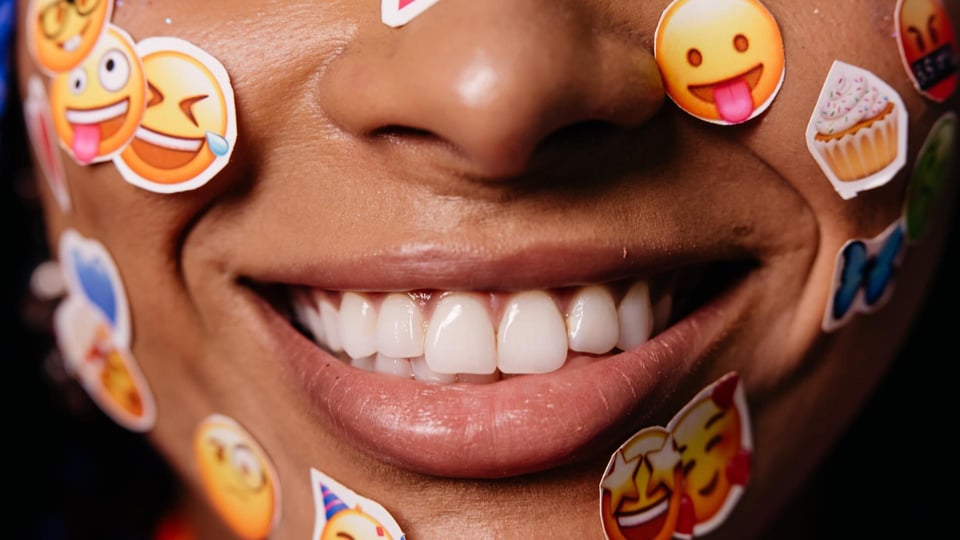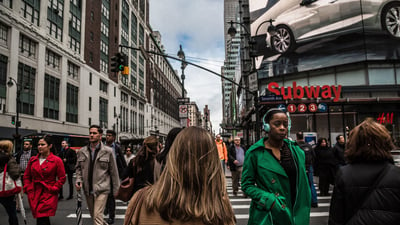If you think emojis have no place in recruitment marketing, think again! 😎🗯️
In case you didn’t already know (but we’re pretty sure you did), an emoji is a visual representation of an emotion, object or symbol that speaks a thousand words that some letters simply can’t. 😀👩🎓
Almost everyone is using emojis to communicate these days. In fact, 92% of the online population uses emojis daily and over 10 billion emojis are sent each day! Which is exactly why they’re so familiar to your target candidate audience.
There are plenty of other reasons to use emojis to enhance your recruitment marketing, and a recent report from Falcon called The Practical Emoji Guide For Social Media Marketers broke it down in great detail.
Below are the most helpful takeaways we uncovered, so you can start incorporating emojis into your social recruiting strategy right now.
Why Use Emojis in Recruitment Marketing? 🤔
➡️ Our Brains Are Programmed to Pick Visuals
For starters, 50 to 80% of the human brain is dedicated to visual processing. Which means we’re hardwired to remember visual aids like colours, shapes, patterns and images more than simple text. Emojis are the perfect combination of all these things, offering concrete evidence for why recruitment marketers should start using them.
➡️ They Make You More Relatable to Candidates
It’s not just about being where your candidates are (hint: on social media!😲). It’s about speaking the same language as them. For many candidates, that language is full of emojis. In fact, according to Adobe, 60% of emoji users are more likely to open emails or notifications if they contain their favourite emoji. So, if you want to connect with your candidates, using emojis is clearly one of the best ways to get them to respond.
➡️ They Humanise Your Employer Brand
Building stronger relationships with candidates on social means showing that real humans are working at your company. Incorporating emojis into your employer branding ads can encourage emotional reactions from your candidates and help you engage with them on a more meaningful level.
➡️ They Draw More Attention to Your Messages
You probably have plenty of competitors in the current talent landscape. Emojis are an easy way to help you stand out from the same old crowd. While everyone else is busy creating bland job ads or social media posts, you can amp up the personality in your candidate experience and provide contextual understanding that text-only messages simply can’t.
Think of an emoji as the “body language” factor of the digital world.
➡️ They Show Candidates You Care
Eighty-eight percent of global emoji users feel more empathetic towards someone if they use an emoji. “Emoji” sounds like “emotion” for a reason. An emoji provides emotional context to your message and helps express empathy to your candidates.
➡️ You Can Connect With Gen Z and Millennials
Like it or not, Millennials and Gen Z, some of the most coveted candidates on the talent market, love their emojis. In fact, a whopping 83% of Gen Z and 71% of Millennials are more comfortable expressing their emotions through emojis than a phone call. So, before you pick up the phone and ask for that interview, you might think about sending an emoji instead.
How to Use Emojis in Your Recruitment Marketing ✨🌟
With all these compelling reasons why you should use emojis, you might be wondering how to do it right. Here are a few steps you can take:
Pick an Emoji to Represent Your Employer Brand 🚀⭐💚📚💪🔥
It could be something as simple as what your company sells, but it might not be as straightforward as a product. Research your candidate audience to see which emojis they’re using the most and map out how you can capture their attention and consistently link it back to your employer brand.
Invite Your Audience to Respond With an Emoji 💬
This is a great way to entice candidates to reply to your posts in an easy, engaging way. A few examples:
- Drop an emoji that describes your current mood
- Comment with the emoji of your favourite vacation destination
- React to this new video with an emoji
- Tell us what’s in your work bag using all emojis
- Show us your reaction to our new blog using only an emoji
Use Emojis in Your Paid Job Ads 💼📱
Forty-two percent of global emoji users are more likely to purchase something that’s advertised using emojis. Similarly, they’ll be more likely to respond to your job ads if you stray from the standard text-only formula and lighten up your ad with emojis.
Create an Engaging Game
Who doesn’t love a game? Why not create an emoji-based quiz that helps candidates learn more about your company or have them describe an entire movie using emojis. These are just a couple of ideas, but you can even use a dedicated app to help you create an emoji quiz online.
A Few Key Points to Consider
Before you start firing away with those emojis, there are a few important things to consider:
➡️ Understand Your Audience
You can’t communicate effectively with emojis if you don’t understand your audience. Study which emojis they’re using so you can target your emoji marketing campaign to their unique preferences. Using emojis just for the sake of it can make you appear tone deaf and do more harm than good in the end.
➡️ Different Cultures and Generations Mean Different Emojis
This goes hand in hand with the above. It’s crucial to be mindful of cultural and generational differences when you’re implementing a social media recruitment marketing campaign. A normal emoji in one country or to one person could be offensive or have a completely different connotation for another. Always be mindful, do your research, and don’t deploy until you’re certain no one will be offended.
➡️ Some Emojis Are Considered Risqué 😱
Emoji meanings can change overnight! Another area where research is essential is to ensure there’s nothing risqué about the emojis you choose. The last thing you need is an embarrassing social media crisis that could’ve been entirely avoided.
➡️ Less is Usually More
Tact is where it’s at. This isn’t about cramming every single emoji into your social media post or paid job ad. There’s a fine art to emoji use, and your candidate might make fun of you for not knowing where to draw the line. When in doubt, less is more.
➡️ Use A/B Testing!
How can you know if your recruitment marketing strategy is successful if you’re not using data to measure the results?
A/B testing can help you answer questions like:
- Are emoji-focused posts getting more engagement than text-only?
- Do emojis on job ads close more applications?
- Are your company’s Instagram followers swiping up when you include emojis in your stories?
Above All Else: Emojis Should be Enjoyed 😍 🌸
The last thing an emoji should ever do is cause unnecessary stress. These little bursts of visual delight are designed to bring out emotion, but they’re not meant to intimidate your recruitment marketing plans.
The important thing to remember is how relatable emojis make you to your candidate audience and how easy it is to use them to boost your employer brand and enhance your social media candidate experience.
Emojis are a win-win, and we hope you’re confident and comfortable enough to start working them into your recruitment marketing strategy today! 🚀








